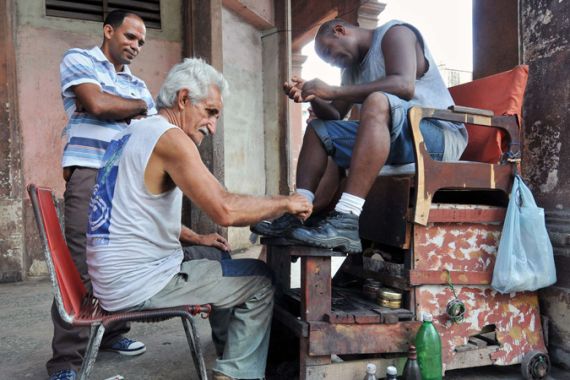Cuba unveils private sector plans
Government issues guidelines for new measure to “save socialism” by loosening restrictions on private employment.

 |
| Impoverished Cubans who are struggling to live on $20 a month welcomed the reforms [AFP] |
Cuba has announced plans to expand its private sector, issuing guidelines for free enterprise activities in 178 fields, ranging from watch repairs to providing transport, state media reported.
The government hopes the new plans, outlined in the Communist Party newspaper Granma on Saturday, will help preserve socialism.
Keep reading
list of 4 itemsParallel economy: How Russia is defying the West’s boycott
US House approves aid package worth billions for Ukraine, Israel
Ecuador weighs security, international arbitration in latest referendum
Under the new measure, Cubans will be able to open restaurants, repair homes and cars, train animals, sell wine, provide transport, work as clowns and open many other businesses, some currently prohibited by the communist-led government.
“The decision to loosen the rules on private employment is one of the steps the country has taken in the redesign of its economic policies to increase production levels and efficiency,” Granma reported, citing Marino Murillo Jorge, the economy minister, and Admi Valhuerdi Cepero, vice-minister of labour and social security.
Bank credits
The paper said the government was considering providing bank credits to the new entrepreneurs, who will be able to hire employees for the first time since small businesses were nationalised in 1968.
The reforms follow last week’s announcement that the government would lay off 500,000 workers by the end of March – or one-tenth of the country’s workforce – the biggest change in Cuba’s economic system since the early 1990s.
Nearly all business in Cuba, the only communist country in the western hemisphere, are government-run.
Cuba’s inefficient economy, crippled by a US trade embargo for nearly five decades, has been suffering for years, and the government of Raul Castro, the president, is beginning to allow an expansion of small-scale private enterprise.
The main goal of the reforms is to “defend, maintain and continue perfecting socialism” by increasing productivity, Granma said.
Self employment, it said, gives a worker “another way of feeling useful with his personal effort”.
Impoverished Cubans tired of making ends meet on an average monthly salary equivalent to $20 welcomed the move.
“Raul [Castro] has done in a few years what Fidel should have done long ago,” Luis Alberto Noa, a 44-year-old restaurant worker, told the Reuters news agency, referring to Fidel Castro, the former Cuban leader.
“That they’re looking for new work formulas proves that the state cannot do everything.”
But, he added, the reforms will only be effective if the government “does not tax the new businesses too heavily”.
‘Increasing productivity’
A Cuban economist told Reuters he was optimistic about the island’s financial future for the first time in a long time.
“The changes are all about increasing productivity, which is what we’ve been saying for years,” he said, asking not to be identified.
Similar steps were taken in the 1990s as Cuba struggled to survive when its economy collapsed after the fall of the Caribbean island’s key benefactor, the Soviet Union.
In 1996, the number of self-employed peaked at 209,000, but when the economy improved, the government, in the name of ideological purity, backed off the reforms and restricted the issuance of new licenses.
Cuba currently has 143,000 licensed self-employed.
With its economy struggling again, Cuba has said it will issue 250,000 licences in October for self-employment to help create private sector jobs for the 500,000 to be laid off.
Another 200,000 government jobs will shift over to employee-run co-operatives and leasing arrangements.
More than 85 per cent of the Cuban labour force, or over five million people, worked for the government at the close of 2009, according to official figures.